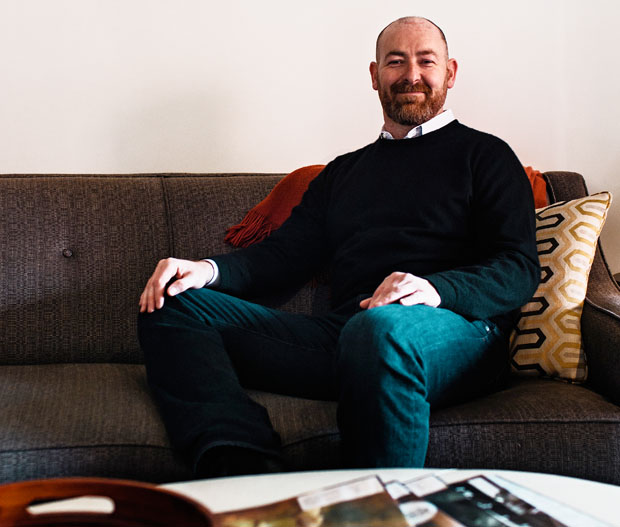BY AMY MILSHTEIN
Damian Smith bets on changing himself — and Portland — through consulting.
BY AMY MILSHTEIN
Damian Smith bets on changing himself — and Portland — through consulting

Damian Smith, owner of Pepper Foster Consulting, is sitting in his light-flooded Pearl District loft/home office, expounding on what he calls his firm’s Big, Hairy, Audacious Goals: BHAG for short.
The BHAG list is audacious indeed. It includes: relocating overseas manufacturing to rural Oregon; building a statewide, high-speed rail network; providing every Oregonian with broadband Internet; setting the minimum wage at double the poverty level; making Oregon schools the best in the nation; and, perhaps the Biggest, Hairiest, Most Audacious Goal of all, bringing the Summer Olympics to Portland.
“I want people in 2050 to look back and say: ‘Pepper Foster was behind all of these projects that improved lives dramatically in Oregon and the world,’” Smith says. “The goal is not to be the biggest company but the one that has the largest positive impact on the lives of Oregonians.”
Smith, 46, hasn’t always been so civic minded, although ambition, along with a certain lack of modesty, appears embedded in his DNA. (The British-born consultant also exudes — as a former boss, Kevin Albright puts it — a “raw intelligence.”)
To be sure, consultants in general tend to be a brash breed, wielding outsized personalities and collecting big paychecks. “They are individuals who need change, enjoy pressure and relish new situations,” observes Kory Kimball, general manager of Slalom Consulting’s Portland office and a former colleague of Smith’s. But if consultants often become business drivers, few think of them as agents of social change or altering the landscape of a city.
Enter Smith, whose life story unfolds as a kind of 21st-century business morality tale. In 1997 he landed his first consulting job, at a Dallas firm called Tactica. He had started his career in the early ’90s, launching emerging American software in the European market. When his wife at the time was transferred back to the U.S., Smith saw it as a chance to change professions.
The fin de siècle was a hard-driving, high-flying time for the industry. Smith’s 60-to 80 hour workweeks saw him on the road, preparing a Texas utility company for deregulation of the electricity market; defining and standardizing software for a quick-growing telecom. The financial rewards were huge. Hires right out of college were making $70,000 a year; partners between $450,000 and $1 million.
“There were lots of parties, lots of benefits, lots of perks,” Smith recalls, describing trips to Lake Tahoe, dinner parties where $400 bottles of wine were uncorked, and bar hopping through the streets of Denver with a dozen colleagues in a stretch limo. His own priorities, Smith admits, were “expensive wines and fancy cars.”
|
Then the bubble burst. The economic downturn brought about by the dot-com bust and 9/11 put the brakes on high salaries and lavish perks industry wide. Margins tightened and billing rates fell. Hitachi acquired Tactica and moved Smith to Portland in 2004 with a mandate to turn the office around.
Couple that with Oregon’s consulting climate and Smith was in for a change. The Oregon market has never been a magnet for consulting firms. Few of the large, international companies like Accenture have offices in the city. Smaller ones, like Slalom, have about 50-100 employees in Portland.
The reeducation of Damian Smith had begun. Working at Hitachi meant he could say goodbye to his brutal travel schedule — the kind of management consulting schedule satirized in the 2009 George Clooney movie “Up in the Air.” Smith ran the branch until 2009, growing it to 45 employees until a mandate from upper management demanded Hitachi become a national consulting firm. “I would be flying to Atlanta, Boston and Seattle every week,” he says. “Last time I had a schedule like that, I put on 50 pounds, and this time I had an 18-month-old daughter I wanted to be home for.”
So Smith tiptoed around his non-compete clause, took a financial hit and started a job at Slalom. Rooted in Portland, Smith nevertheless began feeling antsy. “I wanted to be passionate about my work,” he says. With the encouragement of a mentor and coach, he decided to start Pepper Foster — “pepper stimulates; foster means to help something grow” — with a plan to devote 80% to typical consulting work and 20% to changing the world one BHAG at a time.
“I asked myself what I cared about,” Smith says. “I cared about making a difference for my clients, the people I work with, and for Portland and Oregon.” There was no tiptoeing around Slalom’s noncompete clause, so he took a year off, filling his time by writing an as-yet-unpublished novel, Broken People, a murder mystery set in Dallas and Portland.
Smith won’t name Pepper Foster’s three active clients but says two are the typical, big Oregon companies that hire consultants and one is smaller. He has three employees and says he is not having a problem attracting young, and less expensive, talent. “I recently hired a 28-year-old woman who took a $20,000 pay cut because we echo her personal values,” he says. “This generation realizes that chasing money is a waste of time and doesn’t impact real happiness.”
Smith admits he hasn’t found a client that’s buying Pepper Foster’s services because of the BHAG — yet. Eventually, he intends to bring together entrepreneurs, politicians and philanthropists under the name of the Pepper Foster Asylum to achieve the audacious goals.
Until then, his priorities and lifestyle continue to shift. Smith is still putting in long hours building a new business and still seems obsessed with money — but less with acquiring it for himself and more with what he can do with it. He drives a modest sedan, lives in a smaller house, stays in more than he goes out and is dedicated to his young daughter.
It’s a by now familiar story of social awakening — and social entrepreneurship. It’s also the story of Portland, a city that charts a course between game changing ideas and a comfortable, amenity-driven lifestyle.
“This is our Goldilocks moment,” Smith says. “The time is just right to capture the cultural phenomena and provide economic opportunity while maintaining that ease of life.” And a consultant, he believes, has just the right skill set to coax Portland to be its best self.




